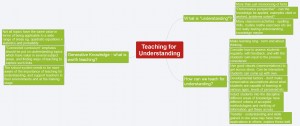An overview of developments in teaching and some current buzzwords. Old method to pursue an academic career was you’d get your own qualification and stand and talk at people for an hour so they’d absorb all the knowledge.
People in many careers are expected to be educators now, not just in standard classrooms but there may often be an educational aspect to working in say a gallery or museum.
Learning outcomes define what the outcome of the course should be and need to be appropriately tested for. TPACK is a map of things you need to know about. Content Knowledge everybody knows some of, but the other two things are Technology and Pedagogy, which need to be built on. Salmon & E-tivities – online learning activities where you get people together online and build a community first, and then get them to contribute to a shared system of learning.
Flipped classroom – from sage on the stage to guide on the side. Transfers agency from teacher to learner, teacher surrenders some control but result is better. Readings and videos are prescribed and class time is used for discussion. A blended model, face to face and tasks.
Personal Learning Environment PLE. How do you build that, tools, people, everything that you use to keep informed of your field.
Research based learning. Used to be telling of a story by an academic. Now students are involved in carrying out the actual research, more hands on.
Seek, Sense, Share. How you acquire and filter out your knowledge and make sense of it, then add value to it and give it back out to the community.
Teaching for understanding. Performances of understanding and ongoing assessment rather than a big test at the end. Generative topics that produce new questipns as the students go along.
Communities of enquiry, building learning communities. Foregrounds discussion – trigger, exploration, integration where you draw things together, and then resolution.
Threshold Concepts. Something that changes how you understand a subject once you’ve mastered it. The Eureka moment, where a little light went on.
Transformative learning is related to this, where the student gets to a level of understanding that changes fundamentally how they think about their subject.
PAH Pedagogy, Andragogy, Heutagogy, deals with regulating and directing your own learning, taking responsibility for your own learning.
Knowledge Management. Writing down how to do things, so someone else can do it. What do we know and how do we combine it with other knowledge to solve issues in the future. A business model.
Critical Pedagogy. How does learning work and how can it be improved. Educator as the lead learner.
All these topics are designed to contribute to more Meaningful Education. Prepares learners for a world which is VUCA – Volatile, Uncertain, Complex, Ambiguous.

